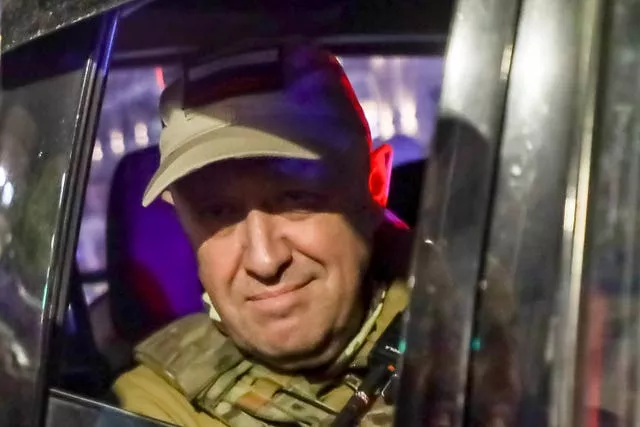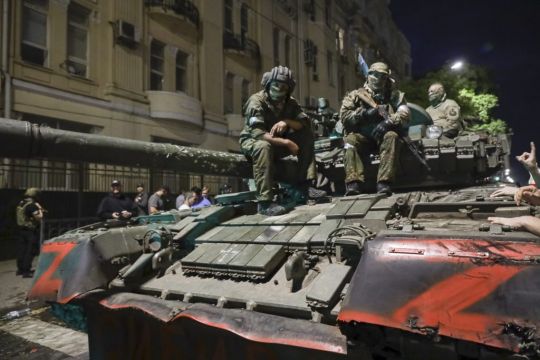The greatest challenge to Russian president Vladimir Putin in his more than two decades in power fizzled out after the rebellious mercenary commander who ordered his troops to march on Moscow abruptly reached a deal with the Kremlin to go into exile and sounded the retreat.
The brief revolt, though, exposed vulnerabilities among Russian government forces, with Wagner Group soldiers under the command of Yevgeny Prigozhin able to move unimpeded into the Russian city of Rostov-on-Don and advance hundreds of miles towards Moscow. The Russian military scrambled to defend Russia’s capital.
Under the deal announced by Kremlin spokesperson Dmitry Peskov, Mr Prigozhin will go to neighbouring Belarus, which has supported Russia’s invasion of Ukraine. Charges against him of mounting an armed rebellion will be dropped.
The Russian government also said it would not prosecute Wagner fighters who took part, while those who did not join in were to be offered contracts by the Defence Ministry.
Mr Prigozhin ordered his troops, many of whom had been fighting alongside Russian regular soldiers in Ukraine, back to their field camps.
US secretary of state Antony Blinken described the weekend’s events as “extraordinary”, recalling that 16 months ago Mr Putin appeared poised to seize the capital of Ukraine and now he has had to defend Moscow from forces led by his onetime protégé.
“I think we’ve seen more cracks emerge in the Russian facade,” Mr Blinken said on NBC’s Meet the Press.
“It is too soon to tell exactly where they go and when they get there, but certainly we have all sorts of new questions that Putin is going to have to address in the weeks and months ahead.”
By Sunday morning there were still no reports of Mr Prigozhin arriving in Belarus. Many other questions remained unanswered, including whether he would be joined in exile by any of Wagner’s troops and what role, if any, he might have there.
Mr Prigozhin, who sent out a series of audio and video updates during his revolt, has gone silent since the Kremlin announced the deal had been brokered for him to end his march and leave Russia.
Video posted on Russian messaging app channels from Rostov-on-Don showed people cheering Wagner troops as they departed. Some ran to shake hands with Mr Prigozhin. The regional governor later said all of the troops had left the city.
Mr Putin had vowed earlier to punish those behind the armed uprising led by his former protégé. In a televised speech to the nation, he called the rebellion a “betrayal” and “treason”.

In allowing Mr Prigozhin and his forces to go free, Mr Peskov said, Mr Putin’s “highest goal” was “to avoid bloodshed and internal confrontation with unpredictable results”.
The risk for Mr Putin is whether he will be seen as weak, analysts said.
“Putin has been diminished for all time by this affair,” former US ambassador to Ukraine John Herbst said on CNN.
Moscow had braced for the arrival of the Wagner forces by erecting checkpoints with armoured vehicles and troops on the city’s southern edge. About 3,000 Chechen soldiers were pulled from fighting in Ukraine and rushed there early on Saturday, state television in Chechnya reported. Crews dug up sections of roads to slow the march.
Wagner troops advanced to just 120 miles from Moscow, according to Mr Prigozhin. But after the deal was struck, he announced that he had decided to retreat to avoid “shedding Russian blood”.
By Sunday afternoon, the troops had withdrawn from the capital, and people swarmed the streets and flocked to cafes. Traffic returned to normal and roadblocks and checkpoints were removed, but Red Square remained closed to visitors. On roads leading to Moscow, crews repaired roads ripped up just hours earlier in panic.
Mr Prigozhin had demanded the ousting of defence minister Sergei Shoigu, whom he has long criticised in withering terms for his conduct of the 16-month war in Ukraine.

The US had intelligence that Mr Prigozhin had been building up his forces near the border with Russia for some time. That conflicts with Mr Prigozhin’s claim that his rebellion was a response to an attack on his camps in Ukraine on Friday by the Russian military.
In announcing the rebellion, Mr Prigozhin accused Russian forces of targeting the Wagner camps in Ukraine with rockets, helicopter gunships and artillery. He alleged that Gen Valery Gerasimov, chief of the general staff, ordered the attacks following a meeting with Mr Shoigu in which they decided to destroy the military contractor.
The Defence Ministry denied attacking the camps.
US Congressional leaders were briefed on the Wagner build-up earlier last week, a person familiar with the matter said.
A possible motivation for Mr Prigozhin’s rebellion was the Russian Defence Ministry’s demand, which Mr Putin backed, that private companies sign contracts with it by July 1. Mr Prigozhin had refused to do it.

“It may well be that he struck now because he saw that deadline as a danger to his control of his troops,” Mr Herbst wrote in an article for the Atlantic Council.
Meanwhile, Ukrainians hoped the Russian infighting would create opportunities for their army to take back territory seized by Russian forces.
“These events will have been of great comfort to the Ukrainian government and the military,” said Ben Barry, senior fellow for land warfare at the International Institute for Strategic Studies. He said that even with a deal, Mr Putin’s position has probably been weakened.
Ukrainian president Volodymyr Zelenskiy said late on Saturday, shortly before Mr Prigozhin announced his retreat, that the march exposed weakness in the Kremlin and “showed all Russian bandits, mercenaries, oligarchs” that it is easy to capture Russian cities “and, probably, arsenals”.
Wagner troops have played a crucial role in the Ukraine war, capturing the eastern city of Bakhmut, an area where the bloodiest and longest battles have taken place. But Mr Prigozhin has increasingly criticised the military brass, accusing it of incompetence and of starving his troops of munitions.
The 62-year-old has longstanding ties to Mr Putin and won lucrative Kremlin catering contracts that earned him the nickname “Putin’s chef”.







